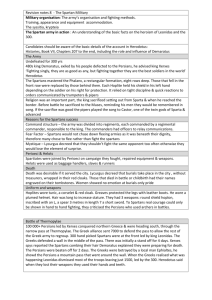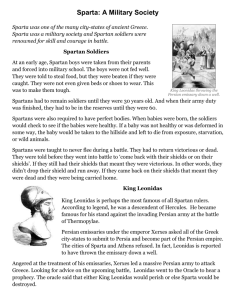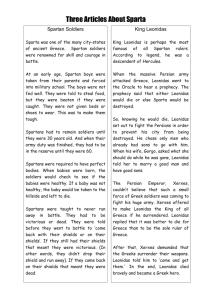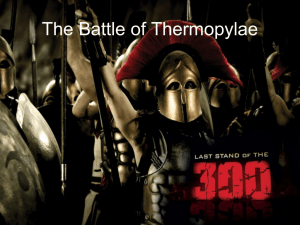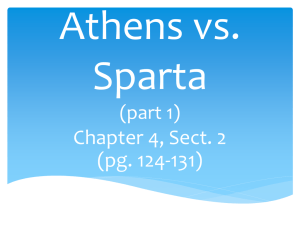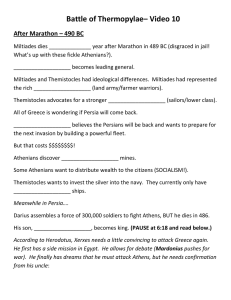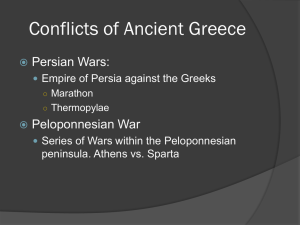Essay Topics for Writing Assignment
advertisement
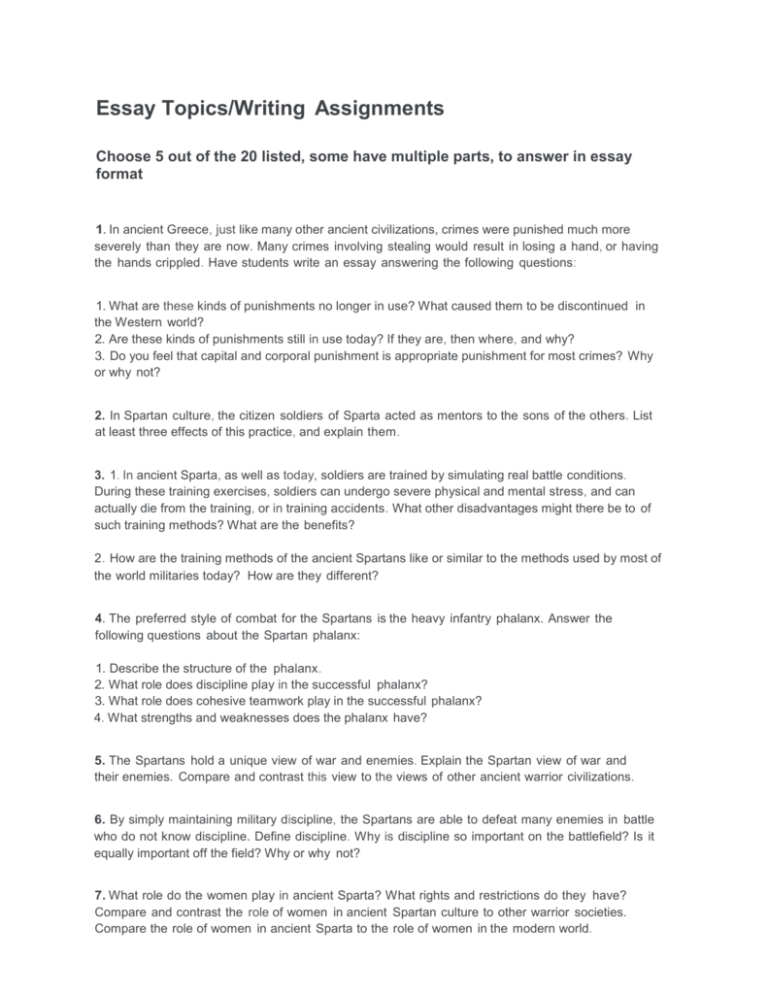
Essay Topics/Writing Assignments Choose 5 out of the 20 listed, some have multiple parts, to answer in essay format 1. In ancient Greece, just like many other ancient civilizations, crimes were punished much more severely than they are now. Many crimes involving stealing would result in losing a hand, or having the hands crippled. Have students write an essay answering the following questions: 1. What are these kinds of punishments no longer in use? What caused them to be discontinued in the Western world? 2. Are these kinds of punishments still in use today? If they are, then where, and why? 3. Do you feel that capital and corporal punishment is appropriate punishment for most crimes? Why or why not? 2. In Spartan culture, the citizen soldiers of Sparta acted as mentors to the sons of the others. List at least three effects of this practice, and explain them. 3. 1. In ancient Sparta, as well as today, soldiers are trained by simulating real battle conditions. During these training exercises, soldiers can undergo severe physical and mental stress, and can actually die from the training, or in training accidents. What other disadvantages might there be to of such training methods? What are the benefits? 2. How are the training methods of the ancient Spartans like or similar to the methods used by most of the world militaries today? How are they different? 4. The preferred style of combat for the Spartans is the heavy infantry phalanx. Answer the following questions about the Spartan phalanx: 1. Describe the structure of the phalanx. 2. What role does discipline play in the successful phalanx? 3. What role does cohesive teamwork play in the successful phalanx? 4. What strengths and weaknesses does the phalanx have? 5. The Spartans hold a unique view of war and enemies. Explain the Spartan view of war and their enemies. Compare and contrast this view to the views of other ancient warrior civilizations. 6. By simply maintaining military discipline, the Spartans are able to defeat many enemies in battle who do not know discipline. Define discipline. Why is discipline so important on the battlefield? Is it equally important off the field? Why or why not? 7. What role do the women play in ancient Sparta? What rights and restrictions do they have? Compare and contrast the role of women in ancient Spartan culture to other warrior societies. Compare the role of women in ancient Sparta to the role of women in the modern world. 8. Describe the landscape of the Hot Gates, and the advantages that it provides the Spartans. Are there any advantages in the landscape for the Persians? Why do the Spartans choose this as the place for the battle? 9. Throughout the book, Xeones describes several things that are common to ancient warfare, such as smoke and fire, rape, and the mutilation of the enemy dead. What other factors are common to ancient warfare? Why do these things occur in ancient times? Do they still happen today? Why or why not? 10. After seeing what losses he takes fighting the Spartans, Xerxes almost leaves Greece and abandons his campaign. How is he persuaded to remain? What emotion drives him to stay? Is Xerxes in control of his own emotions here? Explain your answer. 11. After the battle at Thermopylae , The Persians capture the body of King Leonidas, and mutilate it. Describe what they do to his body. For what reasons might the Persians commit this act of disrespect and defilement on the body of the Spartan king? What about this bothers Xerxes? How does it affect Xerxes' decision making and performance? Describe the dreams that Xerxes has after Leonidas' body is mutilated. Why is he so plagued by these nightmares? Is he afraid? Explain your answers. 12. What is an all-sire unit? Explain what it means to be an all-sire unit. What would it be like to be a member of one of these units? Compare the Spartan all-sire units with similar units of other civilizations and times. 13. Arete offers Xeones some money and the chance to flee Sparta before the army marches off to war. Why does she do this? What causes Xeones to refuse to fleet Sparta when Arete offers him the chance to escape? What causes him to remain with the Spartans in battle, even after he is ordered by Dienekes to leave and save himself? Describe what kind of man you feel Xeones is. 14. What causes Leonidas to offer freedom to the helots, and allow anyone who does not want to stand and die the opportunity to leave? Why do he and his men remain to fight the Persians, knowing that they will die? What are some reasons that so many of them leave? Does leaving the field of battle, knowing that they cannot win and will die, make all of the men who leave cowards? Explain your answer. 15. When the Persians arrive at the Hot Gates, they take about two days to attack. What are they doing during that time? Why does it take so long? Describe the stress and anxiety that might build up for the Greeks over the course of a couple of days of waiting for an attack from a force that greatly outnumbers them. Is it important to distract the soldiers from this stress? Why or why n o t ? How does Leonidas have his men deal with it? What ways of dealing with the stress do some of the men find for themselves? How would you suggest dealing with pre-battle stress, and why? 16. For the first day of the battle, the Greeks are able to fend off several attacks that, simply by the number of soldiers, should have crushed them. All the way to the bitter end, the Greeks are able to inflict great damage on the army of Persia. Describe the strategies used by the Greeks, from the first crossing of arms to the last. 17. Throughout the book, several examples of the differences between Leonidas and Xerxes are given. In what ways are the two kings different? In what ways are they the same? In your opinion, who is the better king? Explain your answer. 18. Xeones denounces Xerxes as a poor king. Why does Xoenes feel that Xerxes is a poor king? How does Xeones describe a good king? In your own words describe Xerxes as a king, and tell whether you think he is a good king or not, and why . 19. During the battle at Thermopylae, several soldiers are caught trying to desert. Answer the following questions : 1. What reasons do the men give for desertion? 2. What reasons does Leonidas give for allowing the men to flee? 3. Why do some of the men beg to be allowed to return to duty after the speech that Leonidas gives? 4. How do the other men feel about those who desert? What do the other men want to do about it? 20. There exists between all soldiers of honor and bravery, a certain respect and admiration. What examples of this are given in the book? Compare these two examples of honor and/or bravery in other literary works. Answer the question, "What is the opposite of fear?"

